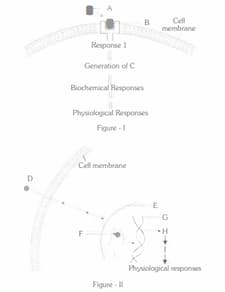Mechanism of Hormone Action
Mechanism of Hormone Action: Overview
This topic covers concepts such as Mechanism of Action of Growth Hormone, Mechanism of Hormone Action, Hormone Receptors, Hormone-receptor Complex, Peptide Derived Hormones, Steroid Hormones, and Amino-acid Derivative Hormones.
Important Questions on Mechanism of Hormone Action
Which of the following hormone is not steroid
Which one of the following is an example of negative feedback loop in humans?
Hormones are called chemical signals that stimulate specific target tissues. Their specificity is due to the presence of signal receiving 'receptors' only in the respective target tissues. Where are these receptors present in case of hormones of protein nature
Which of the following hormones does not contain a polypeptide
Which one of the following is not a second messenger in hormone action
Estrogen and testosterone are steroid hormones, and are most likely bind to
Steroid hormones easily pass through the plasma membrane by simple diffusion because they
Which one of the following pairs of hormones are the examples of those that can easily pass through the cell membrane of the target cell and bind to a receptor inside it (Mostly in the nucleus)
Receptors for protein hormones are located
Consider the given diagrammatic representation of the mechanism of action for categories of hormones. In which of the following option correct answers for blanks A to I are indicated

Which of the following hormones is a steroid?
State the number of hormones that act on membrane bound receptors from the given list.
a. Insulin
b. Glucagon
c. Estradiol
d. Epinephrine
e. Cortisol
Which of the following hormone binds to cell membrane receptors?
A sequential expression of a set of human genes occurs when a steroid molecule binds to the
Which of the following act as a secondary messenger in hormonal action?
Insulin receptors are basically:
The set of hormones which lead to the formation of secondary messengers like cyclic AMP during their mode of action is:
Which one of the following pairs of hormones are the examples of those that can easily pass through the cell membrane of the target cell and bind to a receptor inside it (mostly in the nucleus)?
Choose the incorrect match.
